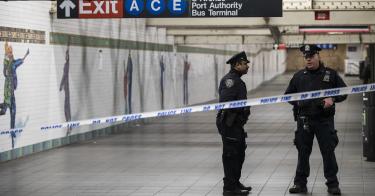Almost 18 years after 9/11, it has been a while since we've heard of any successful Islamist terrorism attacks. That doesn't mean no attempts are being made, however.
If you live in New York City, you probably recall Akayed Ullah's 2017 bombing of the subway tunnel near Times Square.
Fortunately, successful attacks are few and far between of late. But that's not for lack of trying.
So far in 2019, the U.S. has foiled seven Islamist terror plots targeting the American homeland. Here's a quick snapshot of a few of them:
January: Hasher Taheb plotted to attack the White House and attempted to acquire rifles, explosives and rocket launchers. The seller was actually an undercover FBI agent, who along with other undercover agents and informants, had been investigating and communicating with Taheb about his radical ideology and violent plans.
March: Rondell Henry, inspired by terrorist attacks around the world using vehicles, stole a U-Haul truck and drove it around Dulles Airport and the National Harbor in the D.C. area, looking for a prime opportunity to run over pedestrians. He found security at the airport was too tight and the crowds too small on a Wednesday night so he delayed his plans for a day, which gave police time to find him and the stolen truck.
June: Mustafa Alowemer, a Syrian refugee admitted in 2016, plotted to bomb a church with a lot of Nigerian congregants in Pittsburgh in the name of ISIS. His motive: revenge for ongoing counterterrorism operations in Nigeria. Alowemer sought explosives from and communicated with undercover FBI agents who arrested him after he began his final planning for an attack and began acquiring components for a bomb.
Thanks to the hard work of law enforcement, none of these plots came to fruition. While there are many surveillance and counterterrorism policies that Congress and the administration can and have considered over the years - and indeed that's what most public policy experts spend their time thinking about - at the end of the day, the hard work of law enforcement is what has kept us safe.
Sometimes it involves months-long sting operations that follow and then stop a terrorist before he can put his plan into action. Other times it's local police just doing their jobs well, such as locating a stolen vehicle and arresting a terrorist as he waited for his moment.
Of course, it's always safer for everyone involved when law enforcement is carefully following a terrorist rather than finding him in the midst of his plot. Such a proactive approach requires good intelligence tools and resources to locate suspected terrorists and then investigate them before there is any chance of harm befalling the public.
The war on terrorism abroad has also helped. The defeat of ISIS as a controller of territory in Syria and Iraq has helped staunch the recruitment of terrorists and foreign fighters, though unfortunately their vicious ideals are still very much alive.
But we must not get complacent. When discussions about intelligence programs and resources arise, we shouldn't forget just how helpful they have been at stopping all who would attack Americans and our way of life.
Similarly, when cities like Portland and San Francisco pull out of their local FBI Joint Terrorism Task Forces, we should realize that they are doing more than tearing apart law enforcement cooperation - they're erecting barriers to effective counterterrorism work.
After 9/11, it was clear that our policies had prevented us from connecting the dots to stop that horrific attack. Let's not repeat the same mistake.
But for now, let's be thankful. We're fortunate to have thousands of individuals in intelligence and law enforcement working behind the scenes and on the streets to make the U.S. safer. We don't know what tomorrow will bring, but I pray for success of these unsung heroes as they defend our country.
This piece originally appeared in The Helena Independent Record



